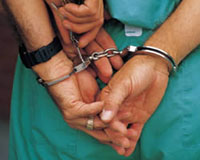| . |  |
. |
United Nations (AFP) June 10, 2009 Major powers on Wednesday agreed on a package of expanded sanctions, including tougher cargo inspections and a tighter arms embargo, to punish North Korea for its recent nuclear test and missile firings. Diplomats said the 15-member Security Council was virtually assured to adopt the text, worked out following two weeks of hard-nosed bargaining by envoys of seven nations, during a vote expected by week's end. The compromise draft was submitted to the full Security Council Wednesday by Susan Rice, the US ambassador to the United Nations, on behalf of the five permanent council members -- Britain, China, France, Russia and the United States -- plus Japan and South Korea. She said that if adopted, the draft will send the message that "North Korea's behavior is unacceptable, (that) they must pay a price, they are to return without conditions to a process of negotiation and that the consequences they will face are significant." Turkey's UN Ambassador Baki Ilkin, the council chair this month, said members would now "evaluate the draft resolution, send it to their capitals and will request instructions on how to proceed." Adoption of the text is virtually assured now that the key players have endorsed it, diplomats said. "We hope that it will be adopted as soon as possible, certainly before the end of the week, and if possible tomorrow (Thursday)," France's UN Ambassador Jean-Maurice Ripert told reporters. Speaking in Moscow Wednesday after talks with his Russian counterpart Sergei Lavrov, German Foreign Minister Frank-Walter Steinmeier said: "We expect a vote (on the North Korean sanctions) at the Security Council by Friday at the latest." Rice singled out in the draft tougher rules for inspection of cargo on air, land and sea to interdict banned material related to North Korea's nuclear and missile activities as well as a tighter arms embargo to choke off "a significant source of revenues for North Korea." The text makes an exception for "small arms and light weapons and their related materiel" although it requires states to notify the Security Council sanctions committee "at least five days prior to selling, supplying or transferring small arms to the DPRK." Rice said the proposed regime "creates an unprecedented detailed set of expectations and obligations regarding the inspection of suspect cargo believed to be carried goods prohibited" under Security Council resolution 1718 adopted in 2006 and under the current draft. She noted that states "are expected to inspect suspect contraband cargo in their territory (land air or sea) and to "consent to inspections on the high seas" if one of their vessels is involved. "States that refuse to be inspected on the high seas are obliged under international law to proceed to an appropriate, convenient port for mandatory inspections," said Rice, making it clear that contraband items found must be seized and disposed of by the state that finds them. Rice's Russian counterpart, Vitaly Churkin, said the text was "balanced" and "carefully targeted at the nuclear and ballistic missile program of North Korea." He added that "any measures which might involve the use of force are ruled out under this resolution." The draft "condemns in the strongest terms" North Korea's May 25 underground nuclear test in violation of UN resolutions and "demands that the DPRK (North Korea) not conduct any further nuclear test or any launch using ballistic missile technology." It declares that Pyongyang "shall abandon all nuclear weapons and existing nuclear programs in a complete, verifiable and irreversible manner and immediately cease all related activities." The Stalinist regime is also required to "immediately retract its announcement of withdrawal from the NPT (Nuclear Non-Proliferation Treaty)" and return immediately to the six-party talks on a nuclear-free Korean peninsula without precondition. The draft calls on states to prevent the provision of financial services or the transfer of any financial or other assets or resources that could contribute to the DPRK's nuclear related, ballistic missile-related or other weapons of mass destruction-related programs or activities. North Korea launched a long-range missile in April, triggering a rebuke from the UN Security Council. Pyongyang then retaliated by announcing May 25 that it had staged a second nuclear weapons test, following one in 2006. It also has declared the armistice ending the 1950-53 Korean War was void.
Share This Article With Planet Earth
Related Links Learn about nuclear weapons doctrine and defense at SpaceWar.com Learn about missile defense at SpaceWar.com All about missiles at SpaceWar.com Learn about the Superpowers of the 21st Century at SpaceWar.com
 US should move quickly to free journalists in NKorea: expert
US should move quickly to free journalists in NKorea: expertSeoul (AFP) June 9, 2009 The United States should move quickly to negotiate the release of two American journalists sentenced to 12 years' imprisonment in North Korea, a South Korean expert said Tuesday. The North's Central Court Monday sentenced TV reporters Laura Ling and Euna Lee to "reform through labour" for what state media called an illegal border crossing and an unspecified "grave crime." Under the ... read more |
|
| The content herein, unless otherwise known to be public domain, are Copyright 1995-2009 - SpaceDaily. AFP and UPI Wire Stories are copyright Agence France-Presse and United Press International. ESA Portal Reports are copyright European Space Agency. All NASA sourced material is public domain. Additional copyrights may apply in whole or part to other bona fide parties. Advertising does not imply endorsement,agreement or approval of any opinions, statements or information provided by SpaceDaily on any Web page published or hosted by SpaceDaily. Privacy Statement |